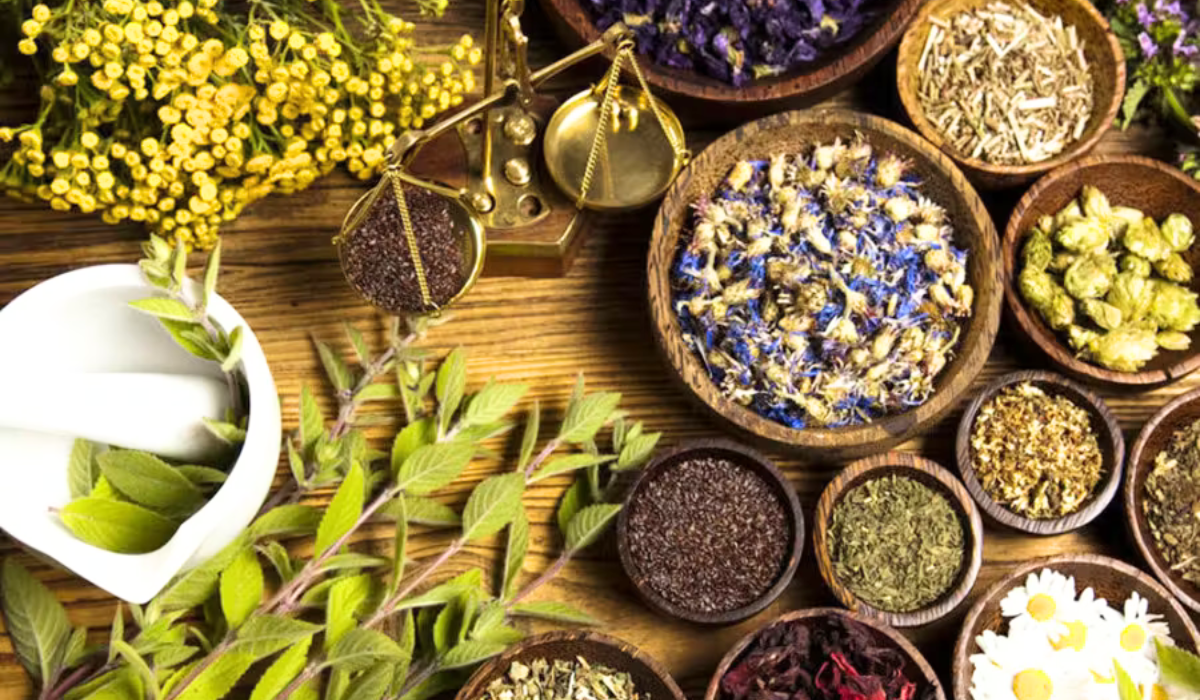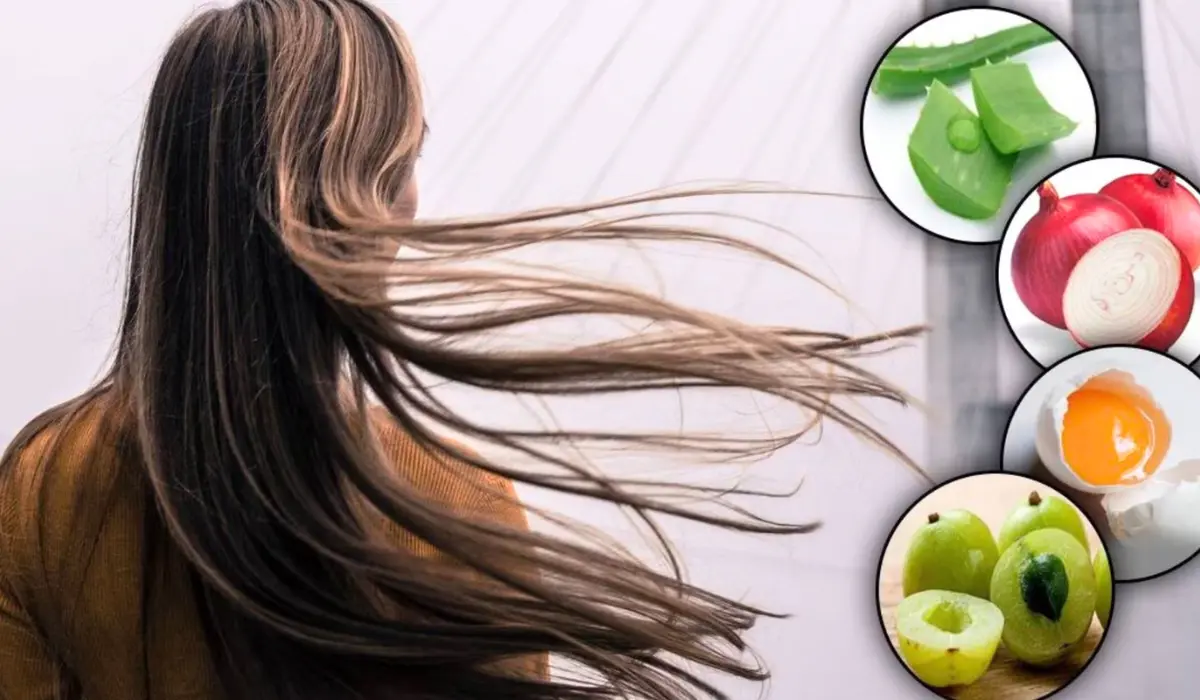Hair growth problems can be frustrating. Healthy scalp conditions, hormonal imbalances, or genetics often stand in the way of reaching longer locks. Multiple hair care products are available. Natural herbs present a less aggressive but often more effective way out. These herbs stimulate hair growth and make your scalp and hair healthy.
This article will teach us about seven amazing herbs that promote hair growth and easy methods to use in your hair routine. Get ready for a natural way to have healthier, longer hair!
Do Herbs Boost Hair Growth?

Hair loss is a common issue for both men and women. It can happen for many reasons, such as genes, insufficient vitamins, or hormone changes. Some health problems, like issues with the thyroid, can also make hair thin or fall out. There’s no surefire way to grow hair back quickly, but studies suggest some herbs help slow down hair loss or encourage new hair growth. But remember, most of this research was done on animals. We need more studies to be sure these herbs work the same way in people.
What Causes Hair Loss?
Hair grows in different stages. Most of your hair is growing all the time. This is called the anagen stage. Then, there’s a stage where hair begins to stop growing, known as catagen. Lastly, in the telogen stage, hair rests and eventually falls out.
Normally, people lose roughly 100 hairs a day. If you lose more than this, notice your hair part getting wider, or see bald spots, you might be experiencing hair loss.
Hair loss can happen for many reasons. It could be due to another health problem or a side effect of a treatment. Sometimes, it’s because of a condition that directly affects the hair.
Best Herbs To Promote Hair Growth
Aloe Vera
Aloe vera is known for its calming and moisturizing properties. It helps reduce scalp irritation and dandruff, which can hinder hair growth. Draw out the gel from an aloe vera leaf and apply it to your scalp. Leave it on for about an hour before rinsing with a mild shampoo. Regular use can lead to healthier scalp conditions and faster hair growth.
Rosemary
The oil stimulates hair follicles and increases blood circulation in the scalp. Rosemary oil promotes faster hair growth. After shampooing, boil some dried rosemary, strain the liquid, and rinse your hair with it. It’s also known for darkening hair, making it a natural solution for those experiencing premature greying.
Lavender
Lavender is known for its calming scent. It also promotes hair growth and reduces stress, which can contribute to hair loss. Combine a few drops of lavender essential oil with a carrier oil like coconut and massage it into your scalp. This can improve blood circulation, promoting healthier hair growth.
Peppermint
Peppermint stimulates the scalp with its cooling sensation, encouraging hair growth. It’s also effective in awakening dormant hair follicles. Blend peppermint oil with a carrier oil and apply it to your scalp to stay on for about 30 minutes before washing. This can also help in reducing scalp itchiness and dandruff.
Ginseng
Ginseng is known for its ability to nourish and strengthen hair. It’s rich in saponins, which encourage hair growth. You can infuse ginseng root in oil and apply it to the scalp. Alternatively, you can take supplements orally to improve overall hair health.
Nettle
Nettle, rich in silica and sulfur, helps make hair shinier and healthier. It can create a nourishing hair rinse by boiling nettle leaves in water and then straining the mixture. Use this as a final rinse to combat hair loss and stimulate growth.
Hibiscus
Hibiscus is packed with vitamins and antioxidants that encourage hair growth. You can make a paste of hibiscus flowers and leaves and put it in your hair. Leave it on for a few hours before rinsing. Regular use of hibiscus can also prevent hair breakage.
Other Simple Tips for Treating Hair Loss
There are other ways to treat hair loss or thinning hair. You can change your hair products, dry it with a towel, or let it air naturally. A flat iron on low heat and not more than every other day is also good. Choosing looser hairstyles and avoiding tight ones like cornrows, braids, and hair extensions can help, too. Some medications encourage hair growth. Others target the immune system and hormones.
Eating a healthy diet might help your hair as well. Research suggests that following the Mediterranean diet and eating foods high in protein and soy can be beneficial. These dietary changes can support other treatments for hair loss.
Potential Side Effects
The primary concern in using herbal hair growth products is the risk of an allergic reaction. To ensure safety, it’s essential to conduct a patch test:
- Put a dab of the herbal preparation on the inner part of your wrist
- Do not wash it off for at least a day.
- If no redness or itching signs are visible after a day, you may use the product on a larger area.
Other potential side effects of topical herbal hair growth products can be:
- Poor result – hair thinning, contrary to one’s wishes.
- It increases hair loss, a deterioration of the first problem.
- Scale dryness, which may develop into itchiness or dandruff.
Possible allergic reactions include
- A skin rash or hives
- The occurrence of redness or itching in the area where the product was applied.
- Breathing problems may be a severe reaction.
- Having a dizzy sensation or getting a headache.
Special caution is advised for women who are pregnant or breastfeeding:
Do not apply herbs to your hair to enhance its growth without the consent of a healthcare professional.
These products should be used under the care of a doctor or an acknowledged natural health practitioner. This is to ensure the safety of both mother and child.
Wrap Up
In summary, herbs like Aloe Vera, Rosemary, Lavender, Peppermint, Ginseng, Nettle, and Hibiscus can naturally promote hair growth. They can also aid scalp wellness. Integrating these herbs into your hair care routine can help your hair grow. It can also keep your scalp healthy.
Always accompany these herbal treatments with a healthy diet and proper hair care practices. Perform a patch test to avoid allergies. Consult healthcare professionals, especially if pregnant or breastfeeding. More research is needed. These herbs provide an effective, natural solution for healthier, thicker hair.
References:
- Schneider M.R., Schmidt-Ullrich R., Paus R. The hair follicle as a dynamic miniorgan. Curr. Biol. 2009;19:R132–R142. doi: 10.1016/j.cub.2008.12.005. [PubMed]
- Marshall WA, Tanner JM. Variation in the pattern of pubertal change in girls. Arch Dis Child 1969; 44: 291–303.

